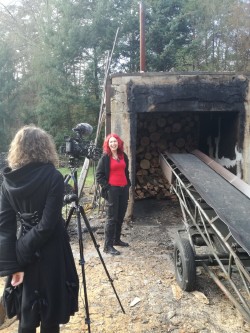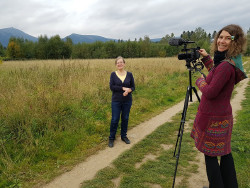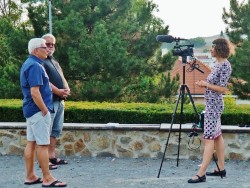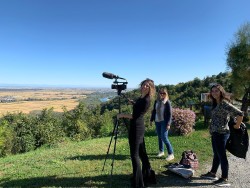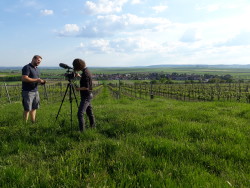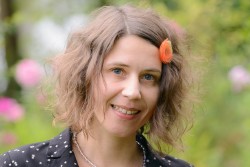DOCUMENTING THE HISTORY OF NEAR-NATURAL GREEN SPACES AND THEIR PRESENT USE BY PEOPLE IN CENTRAL EUROPE
We spoke to Lenka Ovčáčková who is producing short documentary films for MaGICLandscapes. In these films she is reflecting on people‘s relationship with their environment in the nine project case study areas from a historical and contemporary perspective and their ideas of sustainably managing green infrastructure.
What is your motivation to film people and their relationships to their (natural) environment in a documentary film format?
Lenka Ovčáčková: I spent my childhood and early youth in the White Carpathians, a border area between Moravia and Slovakia. It was there that I began to feel a deep connection with nature. My studies in Environment at the Masaryk University Brno and my doctoral studies in Philosophy and History of Science at the Charles University Prague served to further increase my knowledge and deepen this bond with nature. In 2006 I started to produce documentary films inspired by a philosophical-lyrical attitude to the holistic perception of nature, the landscape, and the people living in the diverse border regions of central Europe. After 13 years I have produced 9 bilingual films, and more will follow.
What do you want the films to communicate?
Lenka: I hope to make films that help motivate people to understand nature and landscapes in a holistic way, both from a historical and contemporary perspective. I want the films to guide people in appreciating their own living space and in safeguarding and shaping their environment in a sustainable way.
The project documentaries are enhanced by philosophical and poetical texts. My wish is to enrich the personal reflections of the interviewees by literature to better communicate the multifaceted perceptions of nature and landscapes. This sensible and harmonious connection between people and nature represents a great force that has often influenced the course of history and is in my opinion of vital importance to safeguard our environment and manage our green infrastructure sustainably.
Where exactly did the filming take place?
Lenka: The filming took place in all of the MaGICLandscapes case study areas. I spoke to people in the Dübener Heide and Upper Lusatia in Germany, in the Liberec region and the Jizera Mountains in the Czech Republic as well as in the Polish-Czech border landscape of the Giant Mountains. Further filming and interviews were carried out in the Kyjov region of South Moravia, in the Austrian Waldviertel and Weinviertel, along the River Thaya on the Austrian-Czech border and in the Italian Piedmont in the hills around Chieri near Turin and in the riverine landscapes of the Po around the cities of Vercelli and Alessandria.
How do you organise the filming on the spot – from making the first contact until the last scene?
Lenka: During my research for potential interviewees I was grateful for the support from the project partners. Due to language difficulties they contacted people and arranged appointments and locations for the interviews and filming in Italy and Poland. In those regions where I could speak in Czech, German or English I contacted the people myself - either recommended by the project partners or contacts I found myself. During our first appointment, I introduced them to the MaGICLandscapes project and discussed with them the possibility to take part in my films. The pure landscape shots I made before and after the interviews or I returned once more to the respective region to record nature and landscape in different atmospheres.
How would you describe the interaction between the interviewees and yourself during the film interview?
Lenka: During filming it is important for me to have a friendly and natural interaction with the interviewee. This atmosphere is essential for a good documentary film. When I contacted interviewees I always stressed my holistic approach to the topic of green infrastructure and requested that they reflect on their own subjective views and experiences. The meeting with each interviewee was and is very enriching for me and I really appreciate their openness and willingness to participate in the documentaries.
In your opinion which is the most challenging stage of film production and why?
Lenka: After contacting the interviewees the filming takes place with a view to realising interesting and enriching interviews. This second phase requires high concentration on my part, as I am responsible both for the interviewing and for the filming and technical implementation (camera, sound, direction).
The major challenge for me is the time when I need to select the best interview sequences, music, philosophical-poetical quotes and the harmonising and most representative landscape shots. The raw material for the MaGICLandscapes documentary films already amounts to approximately 15 hours (effective end of October 2019) and the rough versions of the respective regional films are currently around 2 hours long. Now these versions have to be reviewed and edited again and again to be able to communicate the underlying “essence” of the films in the end.
Until now what was the most interesting experience for you during the film shootings for MaGICLandscapes?
Lenka: It’s difficult to pick out just one experience of so many. Perhaps the most impressive experience was connected to the possibility to discover new landscapes and new people, not only concerning the interviewees but also the project partners who supported me greatly when arranging the filming in the case study areas. During the filming I discovered new landscapes like the Italian Piedmont around Torino and the River Po Plain and the Polish side of the Giant Mountains. Apart from these new experiences, the intensive involvement in the regions I already knew provided me with additional perspectives to those I already had. This held true for the Czech-German-Polish tri-border region, the Czech Giant Mountains and the Austrian Weinviertel and Waldviertel. Visiting the case study area around the town of Kyjov was very interesting for me as this region is nearby my birthplace.
Where and when will the short documentary films be presented in 2020?
Lenka: The films will be premiered at the MaGICLandscapes Final Conference on 27th May 2020 in Dresden. After the presentation there will be time to discuss the films with interested attendees. In addition, the partners will screen the region-specific films in the respective national languages in their case study areas. In this context it would be desirable to show on occasion all five films in each region at one go, which will stimulate discussion not only based on the comparison of regional similarities and differences but which also support the broadening of perceptions and ideas in terms of interconnecting regions and people throughout central Europe.
Interview: Anke Hahn
Back to MAIN PAGE
